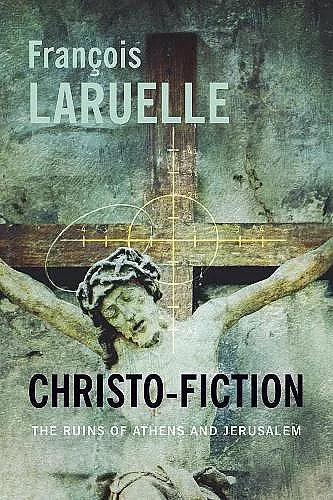Christo-Fiction
The Ruins of Athens and Jerusalem
Francois Laruelle author Robin Mackay translator
Format:Hardback
Publisher:Columbia University Press
Published:12th May '15
Currently unavailable, and unfortunately no date known when it will be back

Francois Laruelle's lifelong project of "nonphilosophy" thinks past the theoretical limits of Western philosophy to realize new relations between religion, science, politics, and art. In Christo-Fiction Laruelle targets the rigid, self-sustaining arguments of metaphysics, and the radical potential of Christ, explicitly inserting quantum science into religion. Positioning itself against orthodox religion and naive atheism alike, Christo-Fiction is a daring, heretical experiment that ties religion to the human experience and the lived world. Francois Laruelle's lifelong project of "nonphilosophy," or "nonstandard philosophy," thinks past the theoretical limits of Western philosophy to realize new relations between religion, science, politics, and art. In Christo-Fiction Laruelle targets the rigid, self-sustaining arguments of metaphysics, rooted in Judaic and Greek thought, and the radical potential of Christ, whose "crossing" disrupts their circular discourse. Laruelle's Christ is the embodiment of generic man, founder of a science of humans, and herald of a gnostic messianism that calls forth an immanent faith. Explicitly inserting quantum science into religion, Laruelle recasts the temporality of the cross, the entombment, and the resurrection, arguing that it is God who is sacrificed on the cross so equals in faith may be born. Positioning itself against orthodox religion and naive atheism alike, Christo-Fiction is a daring, heretical experiment that ties religion to the human experience and the lived world.
A revolutionary effort to restore the radical politics of Christianity and the inherent value of faith.Francois Laruelle's lifelong project of "nonphilosophy," or "nonstandard philosophy," thinks past the theoretical limits of Western philosophy to realize new relations between religion, science, politics, and art. In Christo-Fiction Laruelle targets the rigid, self-sustaining arguments of metaphysics, rooted in Judaic and Greek thought, and the radical potential of Christ, whose "crossing" disrupts their circular discourse. Laruelle's Christ is not the authoritative figure conjured by academic theology, the Apostles, or the Catholic Church. He is the embodiment of generic man, founder of a science of humans, and the herald of a gnostic messianism that calls forth an immanent faith. Explicitly inserting quantum science into religion, Laruelle recasts the temporality of the cross, the entombment, and the resurrection, arguing that it is God who is sacrificed on the cross so equals in faith may be born. Positioning itself against orthodox religion and naive atheism alike, Christo-Fiction is a daring, heretical experiment that ties religion to the human experience and the lived world.
It is no exaggeration to say that the contribution of Francois Laruelle's entire opus and of Christo-Fiction in particular will be historic. The importance of this latest work stems not only from the momentum of the emergence of a 'Laruellian epoch' in philosophy but also from the fact that this is the first work where he reconciles the two great phases in his thought-the 'scientific' one and the one of 'nonstandard theology.' -- Katerina Kolozova, Institute of Social Sciences and Humanities-Skopje Laruelle valorizes and rethinks the place of science for human liberation and how it may operate within philosophical practice itself. However, he thinks that science needs to tell stories, to create fictions, like the fiction of Christ, in order to stand on the side of the victims of history rather than the victors. -- Anthony Paul Smith, La Salle University Laruelle's nonstandard philosophy in Christo-Fiction does not think about Christ philosophically to generate one more ontotheology or political theology: it is the quantum (of) Christ as it might think itself, something both ordinary and radical. This is Schrodinger's Christ, a 'rigorous fiction' where life and death are superposed, not in any theological or supernatural way unique to a deity, but in the radically ordinary of scientific nature, a nontheological messianity that is given 'materielly' through quantum wave and particle. -- John O Maoilearca, author of All Thoughts Are Equal: Laruelle and Nonhuman Philosophy For Laruelle, Christ is pure human happening, which is also the happening of reality as the One, absolutely without any preconditioning, or any ultimate foundation or original framing fixity, which quantum physics has shown not to exist. The science of Christ therefore exceeds both philosophy and theology and is at one with nonphilosophy, which tries to think outside any fictional philosophic circles that arbitrarily claim some ontological factor as primary and another as secondary. In this sense, the 'Christo-fiction' is more true-the claim and following of one man as the whole process, as entirety. We are offered, then, a new mode of gnostic heresy, for which Christian orthodoxy should, nonetheless, be grateful. -- John Milbank, University of Nottingham a profound contribution to a messianic and Christological thought divorced from the strictures of orthodox theology SCTIW Review
ISBN: 9780231167246
Dimensions: unknown
Weight: unknown
296 pages